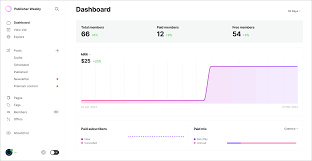The Power of Analytics in Driving Business Success
In today’s digital age, data is king. Businesses have access to more information than ever before, and the key to unlocking its potential lies in analytics. Analytics is the systematic computational analysis of data or statistics, which enables businesses to gain valuable insights into their operations, customers, and market trends.
Analytics plays a crucial role in driving business success by providing actionable intelligence that can inform strategic decision-making. By harnessing the power of analytics, businesses can:
- Gain Deeper Customer Insights: Analytics allows businesses to understand their customers better by analysing their behaviour, preferences, and buying patterns. This information can help businesses tailor their products and services to meet customer needs more effectively.
- Improve Operational Efficiency: By analysing operational data, businesses can identify inefficiencies and streamline processes to improve productivity and reduce costs. Analytics can also help businesses forecast demand more accurately and optimise inventory management.
- Enhance Marketing Effectiveness: Analytics enables businesses to measure the performance of their marketing campaigns in real-time and make data-driven decisions to improve ROI. By analysing customer engagement metrics, businesses can create targeted marketing strategies that resonate with their audience.
- Drive Innovation: Analytics empowers businesses to identify emerging trends and opportunities in the market. By analysing market data and consumer behaviour, businesses can innovate new products or services that meet evolving customer needs and stay ahead of the competition.
In conclusion, analytics is a powerful tool that can transform how businesses operate and compete in today’s fast-paced digital landscape. By leveraging analytics to extract actionable insights from data, businesses can make informed decisions that drive growth, enhance customer satisfaction, and ultimately achieve long-term success.
Enhancing Customer Engagement through Business Analytics Strategies
Strategic Decision-Making: The Advantages of Implementing Analytics
4. Exploring the Spectrum of Business Analytics: A Guide
- What is analytics and why is it important for businesses?
- How can businesses use analytics to improve customer engagement?
- What are the key benefits of using analytics in decision-making?
- What are the different types of analytics that businesses can leverage?
- How does analytics help businesses gain a competitive advantage in the market?
What is analytics and why is it important for businesses?
Analytics is the systematic computational analysis of data or statistics that provides businesses with valuable insights to drive informed decision-making. It involves the use of tools and techniques to interpret data and uncover patterns, trends, and correlations that can help businesses understand their operations, customers, and market dynamics better. Analytics is crucial for businesses as it enables them to gain deeper insights into their customers’ behaviour, preferences, and needs, allowing for more targeted marketing strategies and product development. By leveraging analytics, businesses can improve operational efficiency, enhance marketing effectiveness, drive innovation, and ultimately achieve a competitive edge in today’s data-driven business environment.
How can businesses use analytics to improve customer engagement?
Businesses can leverage analytics to enhance customer engagement by gaining valuable insights into customer behaviour, preferences, and interactions. By analysing data from various touchpoints such as website visits, social media interactions, email responses, and purchase history, businesses can create detailed customer profiles and segment their audience effectively. This data-driven approach enables businesses to personalise their marketing messages, tailor product recommendations, and deliver targeted promotions that resonate with individual customers. Additionally, analytics can help businesses track customer engagement metrics in real-time, allowing them to measure the effectiveness of their strategies and make data-driven adjustments to optimise engagement levels. Ultimately, by harnessing the power of analytics, businesses can build stronger relationships with customers, increase loyalty, and drive long-term success.
What are the key benefits of using analytics in decision-making?
Understanding the key benefits of using analytics in decision-making is crucial for businesses looking to gain a competitive edge in today’s data-driven world. By harnessing the power of analytics, businesses can make informed decisions based on data-driven insights rather than intuition or guesswork. Some key benefits include the ability to gain valuable insights into customer behaviour, improve operational efficiency, enhance marketing effectiveness, and drive innovation. Analytics empowers businesses to identify trends, patterns, and opportunities that may not be apparent through traditional methods, enabling them to make strategic decisions that lead to improved performance and sustainable growth.
What are the different types of analytics that businesses can leverage?
Businesses can leverage various types of analytics to gain valuable insights and make informed decisions. The different types of analytics include descriptive analytics, which focuses on summarising historical data to understand what has happened in the past; diagnostic analytics, which delves deeper into why certain events occurred by identifying patterns and correlations in data; predictive analytics, which uses statistical algorithms and machine learning techniques to forecast future trends and outcomes based on historical data; and prescriptive analytics, which goes a step further by recommending actions that businesses can take to achieve desired outcomes. Each type of analytics offers unique benefits and plays a crucial role in helping businesses drive efficiency, improve decision-making, and stay ahead of the competition in today’s data-driven world.
How does analytics help businesses gain a competitive advantage in the market?
Analytics plays a pivotal role in helping businesses gain a competitive advantage in the market by providing valuable insights that drive strategic decision-making. By analysing data on customer behaviour, market trends, and operational performance, businesses can identify opportunities for growth, streamline processes, and enhance their marketing efforts. With the ability to make data-driven decisions based on real-time information, businesses can respond swiftly to changing market dynamics and stay ahead of the competition. Ultimately, analytics empowers businesses to optimise their operations, improve customer satisfaction, and innovate new products or services that meet evolving market demands, giving them a significant edge in the competitive landscape.

